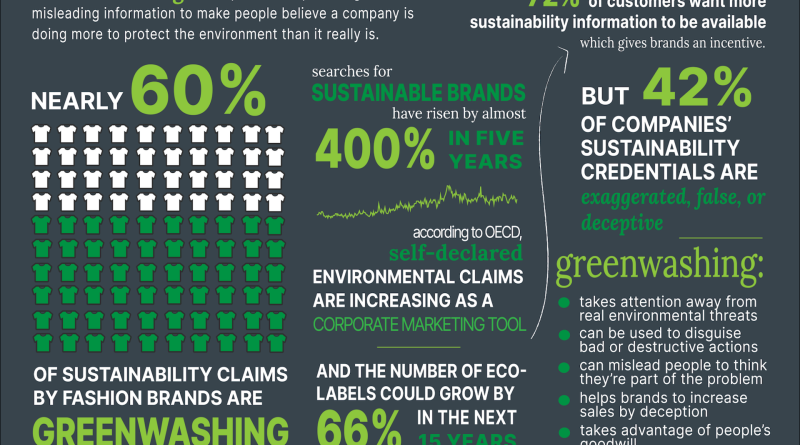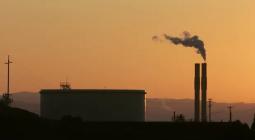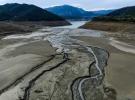What ‘greenwashing’ is (and how to spot it)

What ‘greenwashing’ is (and how to spot it)
Greenwashing isn’t about getting your dishes clean using the least amount of water. Nor is it an innovative way to clean vegetables. No, it’s much more insidious than that.
Greenwashing is when an organisation or brand spends more time and money on marketing themselves as environmentally friendly than on actually being environmentally friendly and minimising their environmental impact.
EMC2: Please consider these characteristic examples:
COP26: ‘Serious lessons’ to be learned as Glasgow summit proves to be the most polluting COP in history
Greenhouse gas emissions from the United Nations climate summit in Glasgow were nearly 30 per cent higher than first forecast, with the UK government using a firm in an offshore tax haven to buy carbon offsets in the wake of last November’s gathering of world leaders.
A sustainability report produced for the UK government - the host of the UN Climate Change Conference of the Parties (COP26) - shows it was the most polluting COP in history, generating residual greenhouse gas emissions totalling 131,556 tonnes of CO2e.
That is not only markedly higher than the emissions forecast last November, when organisers predicted a figure of 102,500 tCO2e, but it also vastly outstrips the pollution from previous COPs. The figure is 157 per cent up on COP25, which was held in Madrid, and 205 per cent higher than the high-profile COP21 summit in Paris, which generated just 43,000 tCO2e.
The new report also confirms the Glasgow gathering produced the highest ever level of greenhouse gas emissions from delegate travel, totalling 103,955 tCO2e - around 79 per cent of the emissions total. That is approximately 2.7 tonnes for each of the 38,462 delegates - the average person in the UK is responsible for around seven tCO2e of emissions a year.
At the time of the summit, there was condemnation of the widespread use of private jets by leaders and their travelling parties. Some 118 different business jets flew into Glasgow and Edinburgh airports in the days leading up to the conference, with around 50 jets landing at the hubs on the opening day. Some jets then flew on to Glasgow Prestwick Airport in order to park.
In a foreword to the report, Alok Sharma, the CO26 president, declared it as “an indispensable guide to future host countries and to the events industry”. He said the government showed an “unprecedented” degree of rigour in COP carbon accounting, which put the UK “at the forefront of sustainable event planning”.
But Dr Richard Dixon, the veteran environmental campaigner and consultant, told Scotland on Sunday: “Even allowing for the greater carbon cost of travel, COP26 was still very significantly more climate polluting than recent COPs.
“This is pretty hard to understand in a country where almost all of our electricity comes from renewables. Serious lessons need to be learnt from the carbon excesses of COP26.”
It comes amid mounting scrutiny of COP26’s legacy. Six months on, there is little progress on climate finance, and emerging evidence of countries turning back towards coal, sparked in part by the war in Ukraine and the resultant energy crisis.
While the gathering - the largest international summit ever held in the UK - ultimately achieved carbon neutrality, there are also growing questions over how the UK government achieved such a standard.
An accompanying report, produced by Arup, the government’s sustainability consultant for the event, shows a major carbon offset strategy was pursued, with the government purchasing 136,720 tCO2 equivalent of carbon offsets across projects around the world.
However, such initiatives have been condemned by environmental groups, who argue it is a fundamentally flawed approach to cutting emissions, and will only worsen the climate emergency in the long run.
Friends of the Earth has said the use of carbon and nature offsets amounts to an “offloading of governmental responsibility” and a “convenient excuse” for governments, businesses and individuals intent on avoiding potentially difficult decisions.
There are also concerns over how the UK government bought its offsets. While some carbon offsets were purchased at projects in Vietnam, Laos, Honduras, and the Pacific Ocean island nation of New Caledonia, Arup’s report notes that more than 40 per cent of the total - 58,839 units - went to a clean cookstove initiative in the West African country of Ghana.
However, the UK government purchased the units via ClimateCare Limited, a company based in the offshore tax haven of Jersey. REDD Monitor, a group which investigates the use of offsets, has pointed out that details of ClimateCare’s corporate arrangements emerged via the 2017 Paradise Papers leak.
Dr Dixon said: “The UK government may have tried to get this right by using their spending to fund projects that really reduce carbon and make people’s lives better. But in one of the big purchases, from ClimateCare Limited, they may have made a mistake.
“You have to ask why an organisation that is supposed to be about doing good in the world needs to be based in a tax haven. The UK government should have smelled something fishy and looked elsewhere."
Elsewhere, the Arup report also details some of the other significant drivers of pollution at the event. The decision to sail a cruise ship up the River Clyde and use it to provide accommodation near to the Scottish Event Campus venue had a major environmental impact, generating approximately 7,350 tCO2e of emissions.
It also shows that despite vows in the COP26 event strategy to “effectively manage waste by repurposing or recycling wherever possible”, just 53 per cent of waste - nearly 61 tonnes - in the summit’s prominent blue zone was recycled.
The report notes that “due to circumstances beyond our control”, a change in the blue zone’s waste management contractor was required in October, just weeks before the summit got underway.
“This meant that there wasn’t as much time to engage with and work with the new contractor to make sure that recycling was the absolute priority for materials,” it adds.
A UK government spokesperson said: “The UK is proud to have hosted COP26, the most important climate negotiations since the Paris Agreement and the largest international summit the UK has ever hosted.
“The UK was fully committed to delivering a sustainable, carbon-neutral summit and is delighted that COP26 was the first COP to achieve PAS 2060, the international standard for carbon neutrality.
“To demonstrate our commitment to sustainability, we took the decision to include a significantly larger set of indirect emission sources in our carbon reporting for COP26 than was required in order to provide a more complete picture of the carbon impacts of hosting a COP, and a new baseline for future international events.”
https://www.scotsman.com/ | Martyn McLaughlin 29th May 2022
Bristol mayor flies nine hours for TED climate conference
The UK's first city mayor to declare a climate crisis has been questioned for flying nine hours to attend a conference to urge leaders to cut CO2.
Bristol Mayor Marvin Rees told the TED conference in Canada that city mayors could influence carbon policy.
Climate campaigners Flight Free UK calculated the trip created 2.016 tonnes (2,016kg) of CO2 per passenger and was at odds with his message.
The mayor's office said he had a full agenda with networking opportunities.
A spokesman said the mayor was invited at the expense of the TED organisation as a speaker to share ideas and help change attitudes.
'Not just talk'
His office said: "He has been clear - the fight against climate change will be won or lost in cities, which generate three-quarters of global carbon emissions.
"And it is therefore the duty of city leaders to come together, lobby for change and influence each other to make a collective impact.
"The mayor's visit to Vancouver was not just to deliver the talk. He had a full agenda," the spokesman added - and said the conference offered him the chance to network with other influential speakers and attract future funding and inward investment too.
Flight Free UK said Mr Rees flew some 4,600 miles (7,402km) each way in April to attend the annual TED conference held in Vancouver that he could have appeared at virtually.
Flight Free UK director Anna Hughes, said: "Bristol was the first place in the UK to declare a climate emergency, yet the mayor is acting completely at odds with this declaration.
"Faced with such a precarious climate situation, we need our leaders to demonstrate the kind of action we should all be taking, not flying to another continent to speak, ironically, about the climate emergency.
"Actions always speak louder than words, and in this post-pandemic age of online interactions, it would have been a much more powerful and effective statement to appear on screen."
'Show off'
Mr Rees gave the speech, which is available to watch online, a month before Bristol voted to abolish the position of elected mayor, the Local Democracy Reporting Service said.
He said city mayors around the world were "stepping up and taking action" on cutting carbon emissions.
"I believe there's huge hope in our cities," Mr Rees said.
"Cities are responsible for around 75% of CO2 emissions, and we're also prodigious emitters of nitrogen dioxide and methane. And cities consume 80% of the world's energy.
"But it's the characteristics of cities - their reach, size, density, close proximity of the leadership to the people, their adaptability, and their capacity for reinvention - that mean we can actually plan to manage those numbers."
He said: "While I have the stage, let me show off about my own city, Bristol.
"We're delivering net-zero homes at higher density on old industrial land in the middle of the city.
"This allows us to relieve pressure on urban sprawl, design in active travel and design out car dependency.
"Across our public housing stock, we're replacing bathrooms and replacing fittings with more water-efficient showers, sinks, taps, and toilets."
Mr Rees concluded: "Efficient cities could be one of the most effective tools we have."
But Green councillors in Bristol criticised recent decisions in the city to remove bicycle lanes, and said more action was needed locally.
Shadow cabinet member for climate and ecology, Katy Grant, called for a roadmap for how Bristol could reach net zero carbon emissions by 2030.
"The mayor is right to identify cities across the globe as crucial sites of efficiency, scale, innovation and impact when it comes to fighting the climate crisis," she said.
"But it's just as important that we have city leaders who are prepared to actually make the bold and difficult decisions needed to tackle the climate emergency, such as measures to reduce car use, or prioritising sustainable homes over developers' profits."
https://www.bbc.com/ 27th May 2022
Record private jet flights into Davos as leaders arrive for climate talk
David Attenborough might have urged world leaders at Davos to take urgent action on climate change, but it appears no one was listening. As he spoke, experts predicted up to 1,500 individual private jets will fly to and from airfields serving the Swiss ski resort this week.
Political and business leaders and lobbyists are opting for bigger, more expensive aircrafts, according to analysis by the Air Charter Service, which found the number of private jet flights grew by 11% last year.
“There appears to be a trend towards larger aircraft, with expensive heavy jets the aircraft of choice, with Gulfstream GVs and Global Expresses both being used more than 100 times each last year,” said Andy Christie, private jets director at the ACS.
This is partly due to the long distances travelled, he said, “but also possibly due to business rivals not wanting to be seen to be outdone by one another”. Last year, more than 1,300 aircraft flights were recorded at the conference, the highest number since ACS began recording private jet activity in 2013.
Countries with the highest number of arrivals and departures out of the local airports over the past five years included Germany, France, UK, US, Russia and the United Arab Emirates, according to ACS.
The World Economic Forum disputed ACS’s analysis. . Oliver Cann, of the World Economic Forum, said: “We have been offering incentives to participants to use public transport for some years. We also ask that they share planes if they have to use them; something that has been gaining popularity in recent years.”
The World Economic Forum’s global risk report, released ahead of this week’s meeting, identified environmental challenges, including the failure to mitigate climate change, as top of the list of dangers facing the world economy.
On Monday, broadcaster and naturalist David Attenborough warned that “the Garden of Eden is no more”, and urged political and business leaders to make a renewed push to tackle climate change.
“We have changed the world so much that scientists claim we are in a new geological age, the anthropocene, the age of humans,” he said.
“What we do now, and in the next few years, will profoundly affect the next few thousand years,” added Attenborough, who received a Crystal award from the WEF for his work.
Speaking to journalists after his speech, Attenborough warned that economic models needed to change. “Growth is going to come to an end, either suddenly or in a controlled way.”
• This article was updated on 23 January to incorporate a response from the World Economic Forum
Rebecca Ratcliffe | https://amp.theguardian.com/ 22 Jan 2019
Greenwashing is a performance of sustainability without any of the action of sustainability. At its simplest, greenwashing can be subtle packaging tricks. Think of the battery-farmed eggs with pictures of rolling hills and verdant countryside on the box. It’s not making an outright claim but it is trying to guide us away from the reality of how those eggs were farmed.
On a much larger scale, greenwashing can affect culture in pretty massive and alarming ways. We’re all familiar with the concept of a carbon footprint, right? But how many of us know that the term ‘carbon footprint’ and the concept of carbon footprint calculators were the invention of BP with the help of ad agency Ogilvy? The idea being that it’s individuals that are responsible for heating the world by going to work, travelling and eating food – rather than the responsibility of enormous oil conglomerates who have leaked hundreds of millions of gallons of oil into the Gulf of Mexico.
And yes, clearly it’s a good thing for all of us to be aware of our carbon footprints but having a company like BP be the arbiter of our actions is greenwashing of the highest order.






